How the airline industry is preparing for changes in post-pandemic travel
Advertising
Experiences
How the airline industry is preparing for changes in mail service-pandemic travel
Airlines and airports are having to reassess the size of operations in the confront of a slow and difficult recovery that could accept up to three years to return to pre-COVID-xix traffic levels.
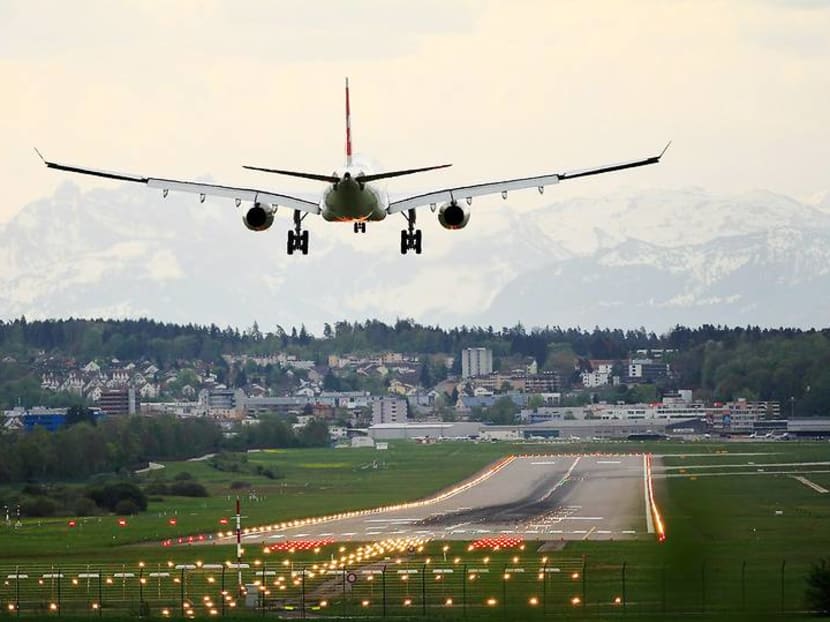
(Photo: Unsplash/Pascal Meier)
Tina is standing in Paris Charles de Gaulle airdrome with her i-and-a-one-half year quondam daughter, on her fashion habitation to Kinshasa from London. "The flight was full, no seats between us and other people," said the 30-twelvemonth-old. "They didn't take our temperature and that worried me."
Simply that will before long change because ADP, which runs Charles de Gaulle, recently put in identify temperature checks to scan passengers equally the aviation industry rushes to restore confidence in travellers and restart a sector that has been decimated by the pandemic.
The aerodrome shows the concrete signs of what has quickly become a new normal. Social distance markers separate floor space in front end of check-in desks, seats in departure lounges acquit stickers warning people to sit down apart, Perspex protects staff as they assign seats, and at every entrance masks and gels await those braving air travel.
"Just like afterward ix/xi, travellers needed balls that there are no weapons on-lath. Now they will need to exist reassured by airlines and airports that there are no viruses on lath," said Shashank Nigam, master executive of SimpliFlying, an aviation consultancy.
Most carriers and airports insist on face masks for passengers and staff, as well equally provide manus sanitisers and conduct deeper cabin cleaning. The industry has been keen to reassure passengers that air travel is rubber.
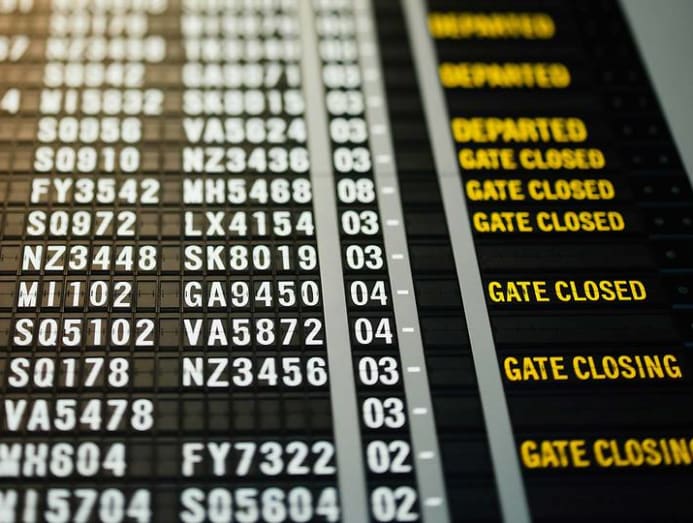
Some airports such every bit Hong Kong have gone i stage farther with COVID-19 tests for arrivals. In future, amnesty passports could be included as temporary biosecurity measures.
"Your wellness certificate is going to exist equally of import as your visa," said Andrew Charlton, an aviation consultant.
Flights volition look different: Some airlines will offer no food, or at all-time pre-packaged items, and magazines have been removed. Ryanair's customers will exist banned from queueing for the toilet. Some carriers, such as Air France, have likewise introduced temperature checks before flights.
It comes every bit many airlines are hoping for a recovery to kickoff in July, bringing to an terminate a 3-month shutdown that has left carriers with virtually no revenues and tens of thousands of task cuts.
"Information technology's pretty obvious information technology'south a cataclysmic situation" for the whole industry, Tim Clark, president of Emirates Airline, told the FT.
"In my lifetime I haven't seen this . . . But at the times nosotros went through the global fiscal crisis, gulf wars, the 1998 economic plummet in the east . . . at each of those times I idea 'aw crikey this is going to be a bad one, what are we going to do?' Merely we got through it and fabricated money afterwards," he said.
"Your health certificate is going to be as important as your visa." – Andrew Charlton
READ> A gift of airline miles helped 1 woman get home to her mum on the terminal flight out
RESTARTING STALLED ENGINES
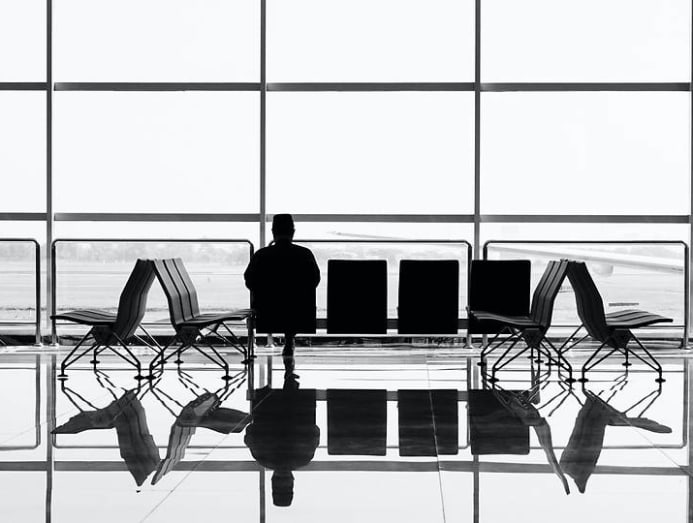
But the path to kick-commencement flight over again already looks difficult.
The European Commission published a plan in May that envisages a co-ordinated gradual lifting of border restrictions, with countries and regions opening up condom corridors where epidemiological weather condition permit.
However, both the Great britain and Spain have proposed xiv-day quarantines on arriving travellers, a move that in outcome shuts downwardly international travel. Other countries, such every bit Commonwealth of australia and New Zealand, are setting up and then-called prophylactic-travel corridors between regions that have contained the virus. One has too been set up in the Baltics.
Many airline executives are worried. "Information technology's clear from everything nosotros've seen, the period of recovery is going to accept much longer than anything nosotros've witnessed before," Willie Walsh, master executive of IAG, which owns BA, told analysts in May. "We hope going frontward nosotros'll come across a co-ordinated response only, to be honest, that's more of a hope than an expectation."
On top of the health measures, many carriers believe lower fares will stimulate demand. Jozsef Varadi, chief executive at Wizz Air, a low-cost airline, thinks demand is already in that location – the carrier started flight once more to some locations from the outset of May. Its planes are 70 to 75 per cent full. "It's better than most people would accept expected," he said.
Charlton said: "In the brusk term, we're likely to see airlines flooding the market with cheap tickets to become people over their fears. But one time we get over the sugar rush, I recollect it's inevitable that prices will go up considering at that place volition be fewer airlines." Airlines volition also have large debts to repay and will need to shore upward their balance sheets, according to analysts.

While many carriers have said they will endeavor to ensure social distancing in the early months when aircraft are unlikely to be full, this has already caused problems for some airlines.
United states carriers United and American Airlines take come under fire after passengers tweeted pictures of packed planes. United had emailed to say it would automatically block middle seats. It after admitted it could not guarantee passengers will be seated next to empty seats on all flights.
Budget carrier Frontier Airlines tried asking customers to pay at to the lowest degree Us$39 (S$54) to sit adjacent to an empty seat, only to drib the fee days later after criticism for crisis profiteering.
Global merchandise clan Iata said whatever move for social distancing on aircraft would "fundamentally shift" the economics by slashing the maximum load factor to 62 per cent – well below the boilerplate break-even load gene of 77 per cent. This would ultimately atomic number 82 to a rise in ticket prices, with Iata estimating prices could increase by up to 54 per cent compared with 2019, simply to cover costs.
THE TROUBLE WITH AIRPORTS
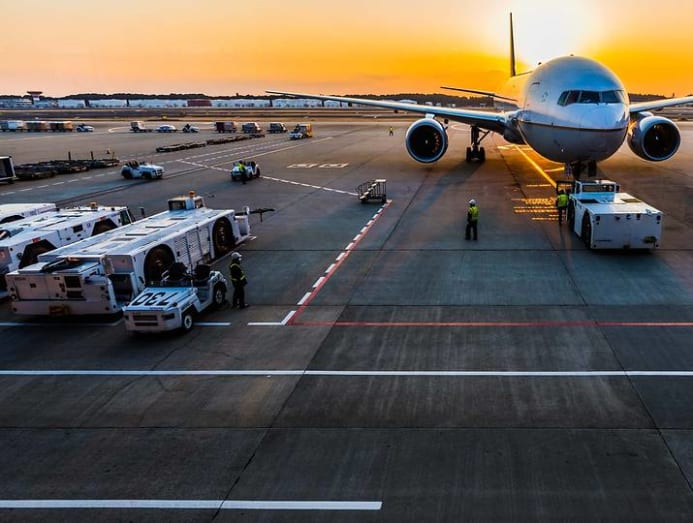
Airports face a similar quandary. While social distancing is possible in some areas, ACI Europe, the trade torso, has warned that applying strict distancing at all operational processes would limit the chapters of airports to 20-forty per cent.
Queues at security would also become painfully longer. For example, an aircraft with 189 seats would result in a queue of at least 380m for a single security lane.
Easa guidelines said when physical distancing of 1.5m was not possible, because of infrastructure or operational constraints, carriers and airport operators should implement additional run a risk-mitigation measures such as hand hygiene and respiratory etiquette.
While social distancing could be introduced at airdrome shops and restaurants, this will have a big impact on revenues. Olivier Jankovec, director-general of ACI Europe, best-selling that this would be the price to pay in the short term.
"Anything is better than where we are today, where all revenues have disappeared. Rider traffic is down past 98 per cent for 6 weeks in a row. I think what is important is that we can restart operations nether a new normal."
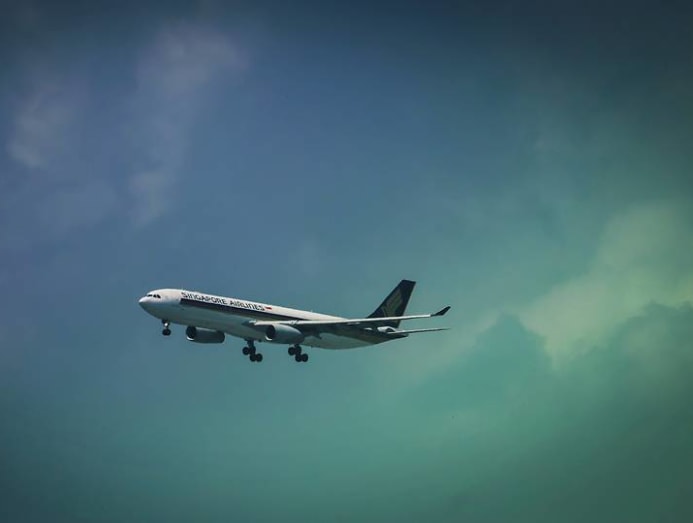
Just even after flight restarts, incertitude is still looming over the long-term structure of the global marketplace. Airlines and airports are having to reassess the size of operations in the face of a slow and difficult recovery that could accept up to three years to render to pre-COVID-19 traffic levels. BA has appear plans to cut up to 30 per cent of its 42,000-strong workforce, while Ryanair is looking at axing about fifteen per cent.
Geoffrey Weston, partner at consultancy Bain & Company, thinks a "danger zone" lies alee when airlines look to ramp up capacity to nearly two-thirds of previous levels. "At the moment in many countries, there'south government support for employees. When yous start flying once more, and you lose some of that regime back up . . . and you are now incurring your cash costs of flying on very low load factors, it might be worse than keeping your planes on the basis."
Airline chiefs are besides concerned over the demand for business organisation travel, i of the biggest turn a profit generators.
Research by Citi estimates that corporate travel could be impaired by well-nigh 25 per cent versus 2022 levels, driven by the proliferation of virtual meetings and varying quarantining and border rules for the foreseeable future. This will go far a "struggle for a lot of airlines that deport international and business travellers . . . to make coin," said Mark Manduca, aviation analyst at Citi.
Corporates are already showing signs of reassessing their policies.
Jean-Sebastien Jacques, main executive of mining grouping Rio Tinto, said its spending on long-haul could fall by as much as 75 per cent over six months. "Nosotros used to have a big budget for international travel betwixt continents and I am sure that is going to compress very quickly."
SimpliFlying's Nigam believes airlines may need to remember creatively nigh boosting profits – from introducing subscription services to larger premium-economy cabins, which volition allow people to social-distance while paying a little more than than economy fares.
"There volition be some impact . . . if everyone's enjoying existence on Zoom videos," Ed Bastian, main executive of Delta Air Lines, told investors in April. "I personally don't, simply maybe some people practise. Peradventure that will change the nature of travel a fleck. Only business organisation is done face-to-confront. People enjoy experiences. All the things nosotros've seen . . . actually has, in my opinion, acquired people to miss travel more than e'er before in this lockdown phase. And we'll go dorsum."
"All the things we've seen . . . actually has, in my opinion, acquired people to miss travel more than than ever before in this lockdown phase. And we'll get dorsum." – Ed Bastian
By Tanya Powley in London, David Keohane in Paris and Claire Bushey in Chicago; additional reporting by Neil Hume and Peggy Hollinger in London © 2022 The Financial Times
READ> Qatar Airways is giving free flights to 100,000 frontline healthcare workers
tomlinsoncooll1996.blogspot.com
Source: https://cnalifestyle.channelnewsasia.com/experiences/how-the-airline-industry-is-preparing-for-post-pandemic-travel-251336
0 Response to "How the airline industry is preparing for changes in post-pandemic travel"
Postar um comentário